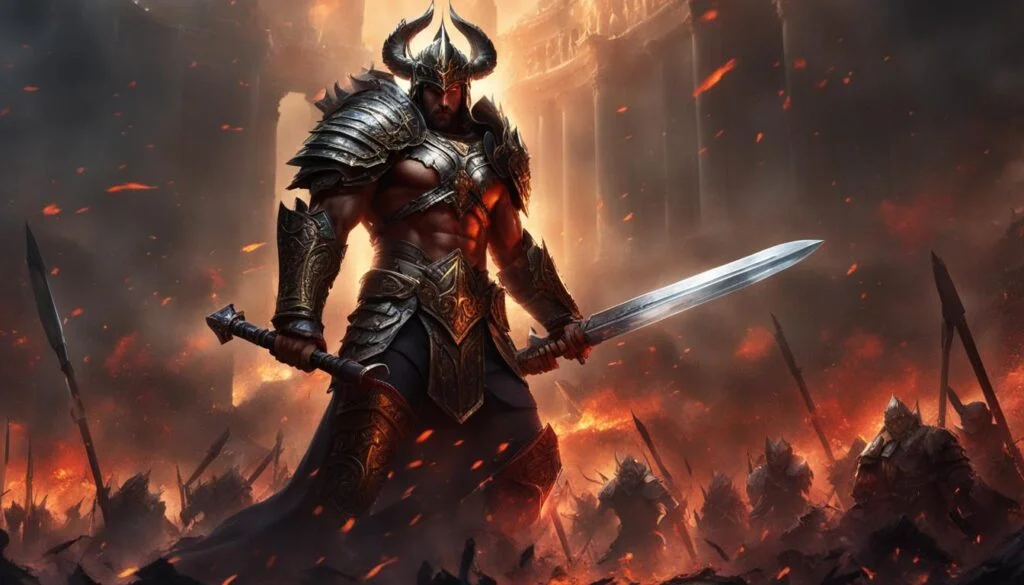Aries Mythology, Greek god Ares, Ares in Greek Mythology
Welcome to our exploration of Aries mythology, where we delve into the origins of the Greek war god, Ares. Known as a prominent figure in Greek mythology, Ares is revered for his association with war and courage. As one of the Twelve Olympians, Ares is the son of Zeus and Hera, embodying physical valor and the brutality of battle. Join us as we uncover the intriguing stories and symbolism surrounding this complex deity.
Key Takeaways
- Ares is the Greek god of war and courage, and one of the Twelve Olympians.
- His origins can be traced back to the Mycenaean period, although his worship was not widespread in Greece.
- Ares represents physical valor in battle, but is also associated with brutality and bloodlust.
- He is often depicted armed for battle, wearing a helmet and carrying a shield and spear.
- Ares’ mythology and symbolism provide insights into ancient Greek culture and the impact of war.
Ares in Greek Mythology
Ares, a prominent figure in Greek mythology, holds a significant role despite not being as prominently featured as some other gods. His character embodies the complex nature of war, encompassing both courage and destructiveness. Ares is often portrayed as a fierce and brutal warrior, his actions frequently leading to conflict and bloodshed.
Despite his association with war, Ares is not immune to defeat or humiliation at the hands of other gods and heroes. This adds depth to his character and showcases the intricate dynamics within Greek mythology. While Ares embodies the violence and aggression of war, he is not invincible and serves as a reminder of the consequences that come with such destructive forces.
To better understand Ares’ significance in Greek mythology, it’s essential to delve into his portrayal as a multi-dimensional figure. While he represents the courage required for warfare, he also encompasses the darker aspects of war that can lead to chaos and suffering.
The image above depicts a representation of Ares in Greek mythology. Notice how he is depicted in armor, armed with weapons, symbolizing his role as the god of war. This portrayal highlights the importance of Ares in Greek culture and their understanding of war’s impact on society.
Ares’ Relationships and Offspring
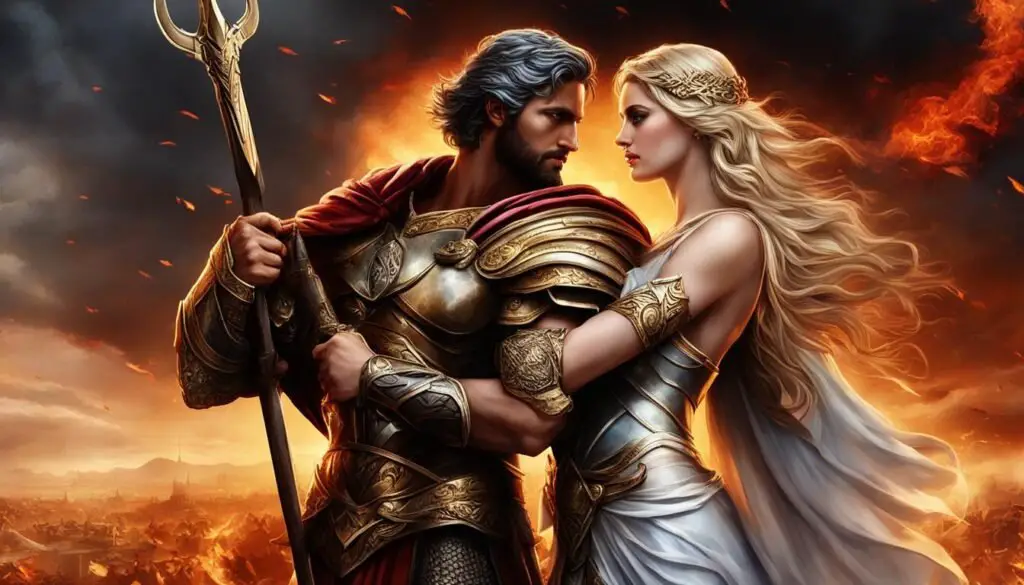
Ares, the Greek god of war, is not only known for his ferocity on the battlefield but also for his complicated relationships and romantic entanglements. One of his most scandalous affairs was with Aphrodite, the enchanting goddess of love and beauty. Despite being married to Hephaestus, Aphrodite couldn’t resist the irresistible charm of Ares.
However, their secret love affair was eventually exposed. Hephaestus, the blacksmith god and Aphrodite’s husband, cleverly devised a plan to catch them in the act and publicly humiliate them. This illicit love affair between Ares and Aphrodite added drama to the already chaotic world of Greek mythology.
During their time together, Ares and Aphrodite had several children, each embodying different aspects of their parents’ characteristics. Among them were Deimos, the god of Fear; Phobos, the god of Terror; and Harmonia, the goddess of Harmony. These offspring inherited both the god of war’s aggression and the goddess’s beauty and allure, making them formidable beings in their own right.
In addition to his children with Aphrodite, Ares had other offspring from various relationships. However, unlike his prominent role in his relationship with Aphrodite, Ares was not heavily involved in the mythologies and legends surrounding his other children.
Explore the tangled web of Ares’ relationships and the impact they had on the world of Greek mythology:
- Ares and Aphrodite: Their scandalous love affair and the repercussions it had on their lives and the lives of those around them.
- Ares’ Children: Delve into the myths and stories of Deimos, Phobos, Harmonia, and other children of Ares, and learn about the unique qualities they inherited from their divine parents.
- Other Relationships: Uncover the lesser-known relationships of Ares and the children he fathered from these unions, understanding the lesser-known aspects of his character and interactions within Greek mythology.
As we explore Ares’ relationships and offspring, we gain a deeper understanding of the complexities and dynamics of ancient Greek mythology, where love, war, and divine entanglements often collided.
Worship and Cult of Ares
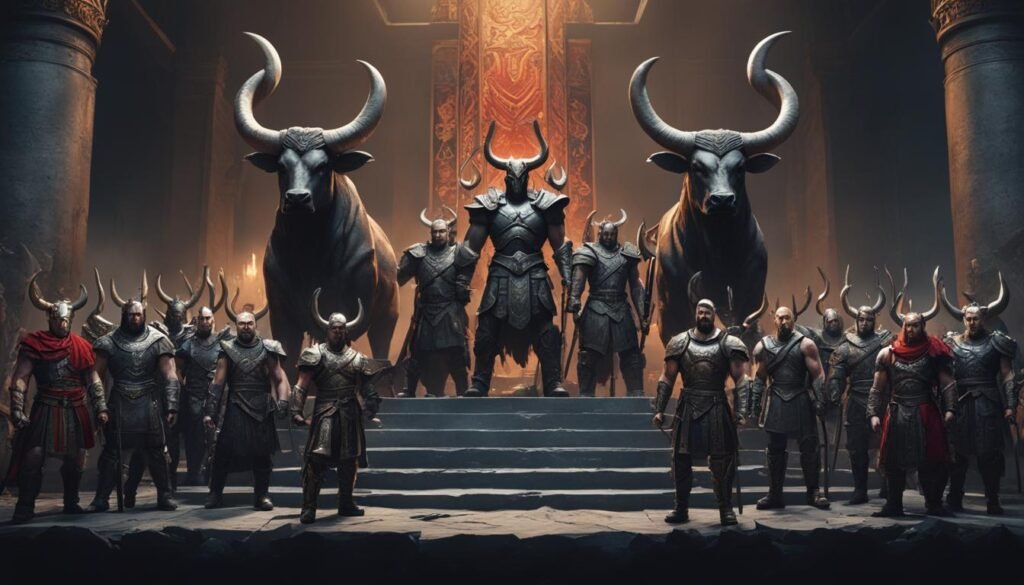
The worship of Ares, the Greek god of war, wasn’t as widespread as that of other gods in ancient Greece. However, there were dedicated temples and cults in certain locations, showcasing the significance of Ares in certain communities. One such place where Ares was particularly revered was Sparta, where annual festivals were held in his honor.
Ares was also associated with sacred sites, such as the Areopagus in Athens, where legal cases involving murder were addressed. This connection between Ares and the Areopagus further highlights his association with conflict and violence.
The worship of Ares involved various rituals and sacrifices, demonstrating the degree of devotion to the god. In some instances, human sacrifices were even made to appease Ares and seek his favor. These practices were performed within Ares’ cults, which were often closely tied to the themes of war and martial spirit.
Examples of Ares’ Temples and Festivals:
- Temple of Ares in Athens
- Temple of Ares at Megalopolis
- Ares’ Festivals in Sparta
Ares’ influence in ancient Greek society extended beyond his mythological role as a god of war, as evidenced by the existence of dedicated temples and the cultural practices associated with his worship.
Ares in Art and Symbolism
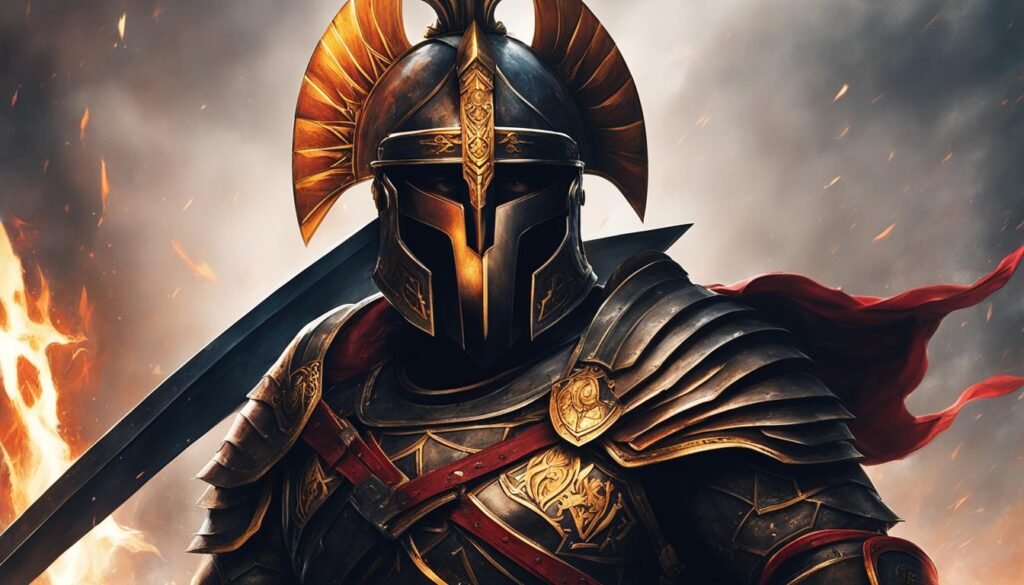
Ares, the Greek god of war, has a strong presence in Greek art and symbolism. Artists often depict him donning armor and wielding a variety of weapons, including swords, spears, shields, and helmets. These attributes symbolize his role as the god of war, representing strength and aggression.
In some artistic portrayals, Ares is depicted in chains, symbolizing the binding and restraint of war. This imagery serves as a reminder of the destructive nature of warfare and the need for control and discipline. Additionally, serpents are frequently associated with Ares, and they are often depicted alongside him in artworks.
To gain a better understanding of Ares’ symbolism, take a moment to visualize an artistic representation of the god of war. Imagine Ares, clad in armor, standing tall with a sword in one hand and a shield in the other. Chains wrap around his body, highlighting the notion of restraint. Serpents coil around his feet, emphasizing his association with violence and aggression.
In a visually captivating image, the powerful symbol of Ares combines elements of war, control, and the inherent dangers they pose. This representation enables us to explore the complexities of conflict and the impact it has on human history and society. Ares’ art and symbolism provide a valuable window into the ancient Greek understanding of war and its significance in their culture.
Key Takeaways:
- Ares is frequently depicted in Greek art wearing armor and wielding various weapons.
- Chains symbolize the binding and restraint of war in Ares’ artistic portrayals.
- Serpents are often associated with Ares and are depicted alongside him in artworks.
- Ares’ symbolism reflects his role as the god of war, representing violence and aggression.
- Artistic representations of Ares contribute to our understanding of the significance of war in ancient Greek culture.
Ares in Mythological Stories
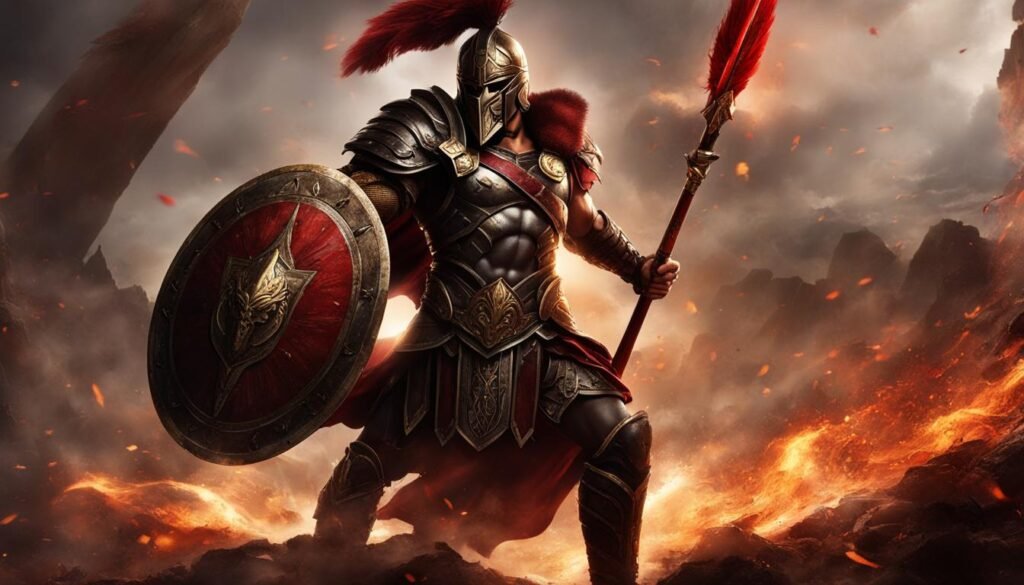
Ares, the Greek god of war, features in numerous captivating myths and stories that showcase his complex character and tumultuous interactions with other deities and heroes. Although his role in these tales is often secondary or antagonistic, Ares’ actions have far-reaching consequences, triggering conflicts and clashes throughout Greek mythology.
One of Ares’ notable appearances is in the epic Trojan War, where he supports the Trojan side against the Greeks. His involvement ignites fierce battles and bloodshed, exemplifying the destructive nature of war. Ares’ unwavering dedication to the Trojans presents a unique perspective within the context of this legendary conflict.
In addition, Ares’ impulsive and warlike nature often leads to encounters with other gods and heroes, where his confrontational tendencies frequently manifest. For instance, Ares is infamously caught in an affair with Aphrodite, the goddess of love and beauty, by her husband, the skilled blacksmith Hephaestus. This event culminates in Ares’ humiliation, leaving him vulnerable and exposed.
These mythological stories paint a vivid picture of Ares’ personality, demonstrating his impetuous behavior and the consequences it incurs. As a figure deeply intertwined with the realm of war, Ares’ presence in these tales offers invaluable insight into the intricacies of Greek mythology and the complexities surrounding the god of war himself.
Exploring Ares’ presence in mythological stories unveils the multifaceted nature of this intriguing Greek deity and sheds light on the intricate dynamics that define the world of gods and heroes.
Ares in Different Cultures
In Roman mythology, Ares was known as Mars. While Ares had a significant presence in Greek mythology, Mars was given an even more important and dignified place in Roman religion. He was revered as the ancestral protector of Rome and the Roman people.
Mars, like Ares, was associated with war, but his domain extended beyond the battlefield. He was also linked to agricultural fertility, highlighting his multifaceted nature and influence over different aspects of Roman life.
The relationship between Ares and Mars demonstrates the adaptation of Greek mythology in Roman culture. Over time, the two figures became almost indistinguishable, with Mars embodying both the warlike attributes of Ares and the agricultural aspects of other Roman gods.
This merging of deities showcases the interconnectedness of ancient mythologies and how they evolved and influenced one another. In Western art and literature, Ares and Mars are often used interchangeably, blurring the lines between the two figures.
Next, we’ll explore the significance of Ares’ portrayal in art and symbolism.
Conclusion
Ares, the Greek god of war and courage, occupies a crucial position in Greek mythology. He embodies both the valor essential for triumph in battle and the destructive, brutal nature of war itself. Although not as prominently featured as some other gods, Ares plays significant roles in various myths and stories. He is associated with powerful symbols such as weapons and serpents, representing his connection to violence and aggression. While Ares’ worship and cult were not as extensive as those of other gods, he had dedicated temples and festivals in certain locations. Overall, Ares’ mythology and symbolism contribute to our understanding of war and its profound impact on ancient Greek culture.
FAQ
Who is Ares in Greek mythology?
Ares, also known as the Greek god of war and courage, is a prominent figure in Greek mythology. He is one of the Twelve Olympians and is the son of Zeus and Hera.
How is Ares depicted in Greek art?
Ares is typically depicted wearing armor and carrying weapons such as a sword, spear, shield, and helmet. He is often shown armed for battle.
What is the role of Ares in Greek mythology?
Ares symbolizes the physical valor required for success in battle. He is associated with courage in warfare, but he is also connected to brutality and bloodlust.
What is Ares’ relationship with Aphrodite?
Ares had a notorious affair with Aphrodite, the goddess of love and beauty. Their affair was discovered by Aphrodite’s husband, Hephaestus, who publicly embarrassed them.
Was Ares worshipped in ancient Greece?
While the worship of Ares was not widespread in ancient Greece, there were certain locations where he had dedicated temples and cults. Sparta, for example, revered him and held annual festivals in his honor.
What is the symbolism associated with Ares?
Ares’ symbolism reflects his association with violence and aggression. He is often depicted carrying weapons and wearing armor. Serpents are also associated with him and often depicted alongside him in art.
What is the significance of Ares in Roman mythology?
Ares had a Roman counterpart named Mars. While Ares was not as highly regarded in Greek mythology, Mars held a more important and dignified position in Roman religion as the ancestral protector of Rome and the Roman people.
What is the overall role of Ares in Greek mythology?
Ares holds a significant place in Greek mythology as the god of war and courage. His character embodies the courage necessary for warfare, as well as the destructive and brutal nature of war itself. Despite not being as prominent as other gods, Ares plays important roles in various myths and stories.


